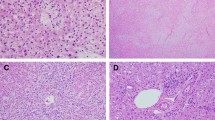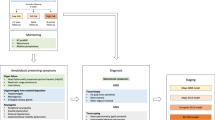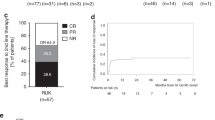Abstract
The morbidity and mortality of AL amyloidosis is caused by the deposition of Ig light chains as amyloid protein in vital organs. With conventional therapy median survival of patients with AL amyloidosis is 10–14 months. With high-dose chemotherapy clinical remissions of organ-specific disease have been reported. Here, we present a patient with high-risk AL amyloidosis who was given high-dose therapy and a peri- pheral blood stem cell transplant. Four days later she died of gastrointestinal perforation due to amyloid infiltrations.
This is a preview of subscription content, access via your institution
Access options
Subscribe to this journal
Receive 12 print issues and online access
$259.00 per year
only $21.58 per issue
Buy this article
- Purchase on Springer Link
- Instant access to full article PDF
Prices may be subject to local taxes which are calculated during checkout
Similar content being viewed by others
Author information
Authors and Affiliations
Rights and permissions
About this article
Cite this article
Schulenburg, A., Kalhs, P., Oberhuber, G. et al. Gastrointestinal perforation early after peripheral blood stem cell transplantation for AL amyloidosis. Bone Marrow Transplant 22, 293–295 (1998). https://doi.org/10.1038/sj.bmt.1701330
Received:
Accepted:
Published:
Issue Date:
DOI: https://doi.org/10.1038/sj.bmt.1701330
Keywords
This article is cited by
-
Colonic Perforation as Initial Presentation of Amyloid Disease: Case Report and Literature Review
Digestive Diseases and Sciences (2020)
-
A multicenter phase 2 trial of stem cell transplantation for immunoglobulin light-chain amyloidosis (E4A97): an Eastern Cooperative Oncology Group Study
Bone Marrow Transplantation (2004)
-
Toxic megacolon: a life-threatening complication of high-dose therapy and autologous stem cell transplantation among patients with AL amyloidosis
Bone Marrow Transplantation (2002)
-
Blood stem cell transplantation as therapy for primary systemic amyloidosis (AL)
Bone Marrow Transplantation (2000)



